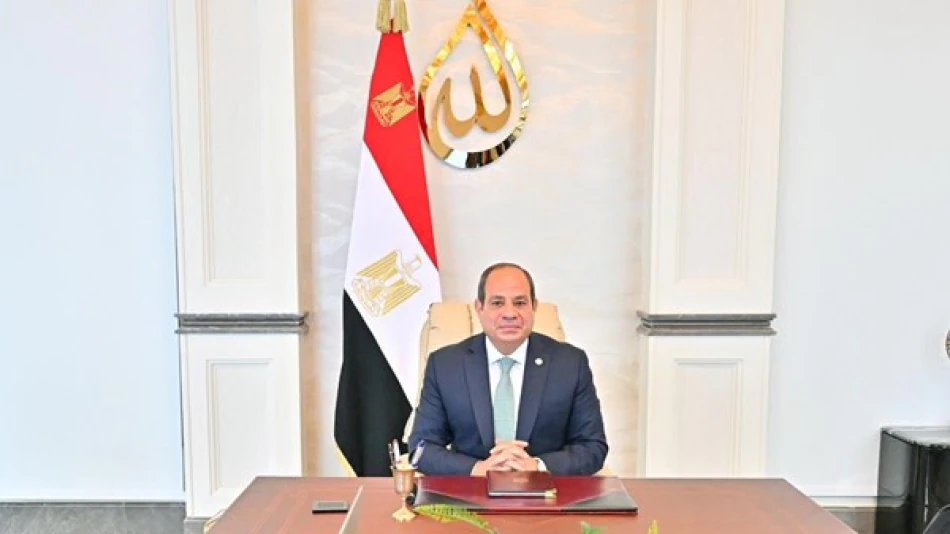
Egypt's President Urges Trump to Address Gaza Crisis Amid Escalating Tensions
Egypt's Sisi Appeals Directly to Trump: "Only You Can Stop Gaza War"
Egyptian President Abdel Fattah al-Sisi made a direct televised appeal to U.S. President Donald Trump on Monday, urging him to end the Gaza conflict and allow humanitarian aid to flow through the Rafah crossing. The plea underscores Egypt's strategic positioning as it seeks to leverage Trump's transactional approach to Middle East diplomacy while managing mounting domestic and regional pressures from the prolonged humanitarian crisis.
A Strategic Gamble on Trump's Influence
Sisi's public appeal represents a calculated diplomatic move, banking on Trump's preference for personal engagement and his administration's potential willingness to pressure all parties toward a resolution. "I address a special appeal to President Trump... he is capable of stopping the war, bringing in aid, and ending this suffering," Sisi declared in the nationally televised address.
This direct approach mirrors successful diplomatic strategies used with Trump during his previous term, when regional leaders found that personal appeals and public recognition of his influence often yielded results where traditional diplomatic channels failed.
Egypt's Delicate Balancing Act
The Rafah Crossing Dilemma
Sisi emphasized that "a huge number of aid trucks are ready to cross the Rafah border," but stressed that Egypt cannot unilaterally open the crossing. "Our values, circumstances, and national and moral responsibilities do not allow us to prevent aid... but the crossing must be open from the Palestinian side for aid to enter," he explained.
This statement reveals Egypt's complex position: while eager to demonstrate humanitarian leadership, Cairo cannot risk appearing to undermine Palestinian sovereignty or inadvertently facilitate Israeli control over Gaza's borders.
Domestic and Regional Pressures
The appeal comes as Egypt faces mounting pressure from its own population and Arab neighbors to take more decisive action. With Gaza's population suffering from acute malnutrition and hunger, Egypt's role as the primary gateway for aid has become both a strategic asset and a political liability.
Market and Geopolitical Implications
For investors and regional markets, Sisi's appeal signals potential shifts in Middle East dynamics. A Trump-brokered resolution could stabilize regional tensions that have disrupted shipping routes, energy markets, and tourism sectors across the Eastern Mediterranean.
Egypt's economy, already strained by currency devaluation and inflation, would benefit significantly from reduced regional tensions and the potential resumption of normal trade flows through its strategic position linking Africa, Asia, and Europe.
Historical Context and Precedent
Sisi's direct appeal echoes similar strategies employed by regional leaders during Trump's first presidency, when the Abraham Accords demonstrated the effectiveness of personal diplomacy in achieving breakthrough agreements. However, the Gaza situation presents far greater complexity than the normalization deals between Israel and Gulf states.
Egypt's positioning as an indispensable mediator draws from decades of experience, from the Camp David Accords to multiple Gaza ceasefires. Yet this appeal suggests traditional mediation may be insufficient for the current crisis's scale and intensity.
The Path Forward
Sisi's gamble on Trump reflects broader regional recognition that American leadership remains crucial for any sustainable resolution. By framing Trump as uniquely capable of ending the conflict, Egypt positions itself as a willing partner while placing responsibility for action squarely on Washington.
Whether this approach yields results will depend largely on Trump's willingness to invest political capital in a complex conflict that has frustrated previous administrations, and on Israel's receptiveness to American pressure for a negotiated settlement.
Most Viewed News

 Layla Al Mansoori
Layla Al Mansoori






